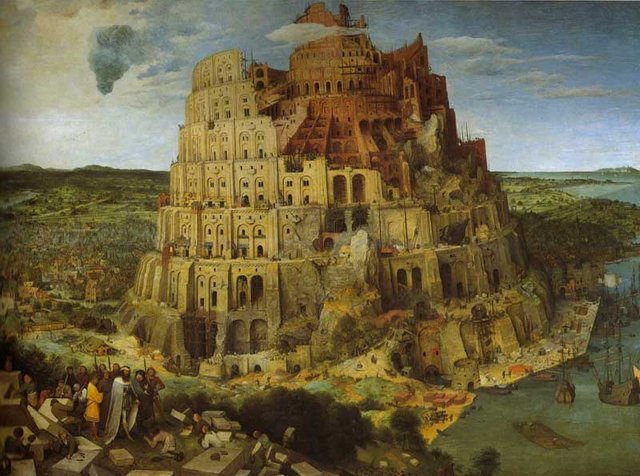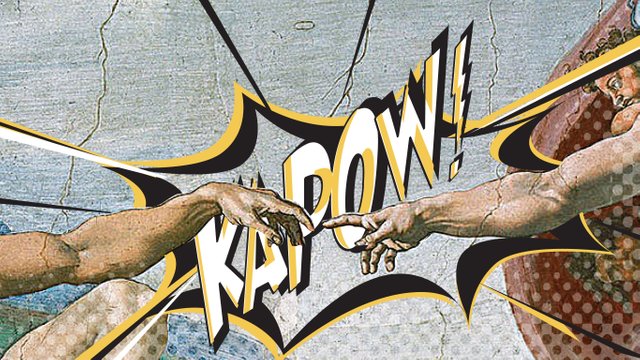Language Is Chaos

Is there a meaning to communication?
Talk to most people about the state of disorder in the world, and there is one thing that most people will agree on: that miscommunication is a major factor. The inability to understand what someone else means appears to be a common trait throughout human civilisation. It begs the question of whether or not human language is inherently chaotic. Does this mean the perennial search for a single, unifying theory is what drives human culture and innovation, or is it a mechanism to ensure diversity and open-feedback?
 image source
image source"The babbling that I brook"
Most of us who were born and grew up in a Western, Judaeo-Christian cultural context will be familiar with the mythology of the Tower of Babel. Found in the book of Genesis, it tells the story of how the people of one city decided to build a tower in order to reach Heaven. God, not being happy with such hubris from his creation, struck down humanity with a curse which rendered them unable to talk and understand each other, and so the building project was abandoned.
1And the whole earth was of one language, and of one speech. 2And it came to pass, as they journeyed from the east, that they found a plain in the land of Shinar; and they dwelt there. 3And they said one to another, Go to, let us make brick, and burn them throughly. And they had brick for stone, and slime had they for mortar. 4And they said, Go to, let us build us a city and a tower, whose top may reach unto heaven; and let us make us a name, lest we be scattered abroad upon the face of the whole earth. 5And the LORD came down to see the city and the tower, which the children of men builded. 6And the LORD said, Behold, the people is one, and they have all one language; and this they begin to do: and now nothing will be restrained from them, which they have imagined to do. 7Go to, let us go down, and there confound their language, that they may not understand one another's speech. 8So the LORD scattered them abroad from thence upon the face of all the earth: and they left off to build the city. 9Therefore is the name of it called Babel; because the LORD did there confound the language of all the earth: and from thence did the LORD scatter them abroad upon the face of all the earth.
— Genesis 11:1–9
As with many of the Genesis myths, there are equivalent stories found in much earlier Sumerian tablets, this one having some correlation to one of the Enmerkar myths. This also is the etymology of the english word "babble", emerging from the original Hebrew word used balal meaning 'to confuse'. The city or the tower only received this name after the confusion of languages.
This serves also as an origin myth about why different cultures and races of humanity had different languages, as before this time there was but one human culture descended from Adam & Eve. It implies that God was not pleased with idea that humanity would reach Heaven, and so created the ground for miscommunication in order to prevent that from happening. Presumably, were humans ever to have a 'single language', this would enable us to cooperate to the extent we could achieve divinity.
Evolutionary Biologists look at the development of speech as being a major turning point in the evolution of Homo sapiens, alongside use and development of tools. With speech comes greater cooperation and organisation, as well as the ability to transmit culture through story-telling, song, and later other forms such as art on cave walls and pottery, and jewellery-making.
The language crisis in ancient China
Words don't come easy to me
— F.R. David
During the later part of the Warring States period in China (~475–221 BCE) there is evidence of a movement amongst scholars and philosophers to address and solve the problem of language. One group of scholars referred to as the 'School of Names' (also called 'Dialecticians') became very concerned with being able to present specific definitions of words and phrases. They were part of the philosophical school of Mohism, and sought to elucidate on the precise meaning of words and phrases in their text, the Book of Mozǐ. This video provides a brief explanation.
An example of this kind of linguistic discourse is can be found in a book called 公孫龍子, the Gōng Sūn Lóng Zǐ:
[A]: Can it be that a white horse is not a horse?
[B]: It can.
[A]: How so?
[B]: "Horse" is how the shape is named; "white" is how the color is named. That which names color does not name shape. Thus I say: "a white horse is not a horse".
[A]: Having a white horse cannot be said to be having no horses. Is not that which cannot be said to be having no horses a horse? Having a white horse is having a horse; how can a white one not be a horse?
[B]: Requesting a horse, a brown or a black horse may arrive; requesting a white horse, a brown or a black horse will not arrive. By making a white horse the same as a horse, what is requested [in these two cases] is the same. If what is requested is the same, then a white horse is no different to a horse; if what is requested is no different, then how is it that in one case brown and black horses are acceptable, and in the other they are not? Acceptable and unacceptable are clearly in opposition to each other. Thus brown and black horses are also one in that one can reply that there is a horse, yet one cannot reply that there is a white horse. It is clear indeed that a white horse is not a horse.
— The White Horse Doctrine, from the Gōng Sūn Lóng Zǐ, (translation by Donald Sturgeon)
The philosopher Huizi, who's only surviving text is the Ten Paradoxes is also thought to have been part of this group, as is the photo-Taoist philosopher Zhuangzi. In many of the sections contained in the Book of Zhuāngzǐ, these two thinkers debate on the meaning of words in context to understanding epistemological and existential truths, as evidenced by the example of the Happy Fish story.
Similar to modern linguists, there was an inextricable link between language and how one viewed and therefore interacted with the world, and this presupposition was common amongst all the ancient Chinese philosophers, as Bao Zhiming writes in this article on Language and World View in Ancient China. So much so that when Qin Shi Huang Di conquered all the various states and formed the first Chinese Empire, he instigated a program of unification of language and writing in order to homogenise the dialects across the various states.
 image source
image source
The end of history
We live in a world of information
Yet no one knows what's going on
— Directions In Groove
Contrary to the current interpretation by cultural conservatives and their uneducated fanboiz, postmodernism is not a singular theory (for how could it be?), and was always intended merely as a descriptor of an historical period and what was emerging amongst scholars, artists, writers, and many others in the wake of the modernist pre-occupation with authority, singularity, and hegemonic monadism.
In many ways, the artistic and literary movement of postmodernism was a much-needed antidote that emerged after the horrors of World War II and the industrial era. It sought to eradicate 'grand narratives' and disrupt the notion of a central/higher authority. Why?
To tell people the meaning of one's text is to impose order on others' thinking, thus not allowing the subjective imagination and engagement with a creative piece. What these creatives were hoping to achieve was that an audience would engage actively and personally with a work of art such as a text, painting, or sculpture. This was a key to Roland Barthes' idea that there are readerly texts (texts we passively consume, where the meaning is objective and explicit), and writerly texts which are actively engaged with, where meaning is subjective and implicit, and the 'reader' is re-writing the text in their own mind as they read it. This latter form is evidenced when different people provide different understandings of what a text (or work of art) is "about".
Thus, an artist living in post-modernity creates purely from their own creative source, offers it to the world unconditionally and says, "here you are, make of it what you will." It becomes the responsibility of the individual to work out what it means to them; to choose to not do so is laziness. In other words, if I want the author or the film-maker to "tell me what its about" or "tell me what it means" it is because I (the reader) don't want to admit that it means nothing to me, or that I don't understand.
There is of course nothing wrong with admitting that, "I don't get it", or "I don't understand". This is where scholars and creatives could use some humility and not presume to think less of someone who simply cannot resonate with their work, for in a pure post-modern state, it is inevitable that there will be a diversity of opinion.
Whilst post-modernity as an historical moment and movement has evolved and moved on (and here I agree with the work of Brent Cooper and the idea that we are emerging into a period of meta-modernity), what it offered human civilisation and culture was the opportunity for a kind of decentralisation. In many ways, it is the Tower of Babel and the Language Crisis all over again.
History never repeats
Deep in the night it's all so clear
I lie awake with great ideas
Lurking about in no-man's land
I think at last I understand
— Split Enz
We seem to have had a fascination throughout history about unifying humanity, whether it be through monotheistic religions, autocratic regimes, economics, or science. What we are experiencing is a cultural shift through the decentralisation of all monadic structures, much of which is modelled off what happens in nature anyway. Structures in natural systems are for the most part decentralised, and chaotic. Biomimicry holds much sway in the world of technology, design, and UX; although this is nothing new, as much of Taoist thought was in modelling cultural and political systems along the lines of the Dào, or the 'Way' of the natural universe.
Language is no different, and I believe that allowing for an interplay between objective/subjective in our perception when approaching what we hear or read allows for a more authentic personal human experience of the world. In this I would like to bring two specific examples of how language devoid of any deliberate intention can be used to bring great meaning.
The @WisdomOfChopra twitter feed gathers the words that New Age philosopher Deepak Chopra tweets on his own account, and then randomly puts them together to create phrases which sound no different, but often hilariously poignant in demonstrating how language is put together to construct meaning. If you don't have Twitter, you can randomly generate your own 'wisdom of Chopra' here.
The Inspirobot is a wonderful bot that creates 'inspirational' memes from random words and phrases pasted onto random stock photographs.
In both of these examples, words are nothing more than a meaningless, random generation of sounds created by an algorithm. In both of these examples, there is no intention behind the words whatsoever, literally random words grouped together by a robot. This is kind of like the control group in an experiment, as if we were to take the words constructed by a writer we could say that there is an intention behind their construction. These however are constructed without an intention behind them; and yet the reader can interpret them to hold some personal meaning.
Here are two examples that I generated as I wrote this story.
The key to joy is the foundation of the progressive expansion of brains.
— Wisdom of Chopra
 image source
image sourceWhilst I know both are essentially gibberish, if I drop into a state of non-thought and contemplate these, I am able to discover a way that this 'advice' applies somehow in some context in my life. This is also essentially how the practice of divination works — the active engagement with a highly-generalised sign (e.g., a Tarot card, or an astrological symbol) in order to find a way for that sign to relate to a specific area of my life. In this regard, I believe humans have always created writerly texts and that is the basis of all forms of fortune-telling, spirituality, and literature.
Language is indeed chaotic. A word does not hold any objective truth, although there will be a truth assigned to it through convention within a group context. Even then however, how the individual engages with the word will determine ultimately how that meaning is used to inspire thoughts, speech, and deeds.
After the Tower of Babel was abandoned, the people then scattered themselves across the world and settled distant lands and formed different cultures and societies, and built many new and different cities. And yet despite this diversity, we have continued throughout millennia to evolve and learn more and more about the universe. Despite having abandoned the original tower, we are still reaching for Heaven, but through diverse, personal means rather than monolithic, hegemonic structures.


CREATE YOUR OWN @REVIEWME PROFILE TO START EARNING CREDIBILITY STARS FROM THE COMMUNITY!
CREATING YOUR PROFILE IS EASY! JUST FOLLOW THE STEPS HERE ☜(ˆ▿ˆc)
Posted from my blog PANDORA'S LOST GIFT with SteemPress : http://metametheus.net/language-is-chaos/
@metametheus has set 2.000 STEEM bounty on this post!

Bounties are a new way you can earn rewards irrespective of you Steem Power. Go here to learn how bounties work.
Earn the bounty by commenting what you think the bounty creator wants to know from you.
Find more bounties here and become a bounty hunter.
Happy Rewards Hunting!
Congratulations to the following winner(s) of the bounty!
Find more bounties here and become a bounty hunter.
Find more bounties here and become a bounty hunter.
Find more bounties here and become a bounty hunter.
Find more bounties here and become a bounty hunter.
Find more bounties here and become a bounty hunter.
Find more bounties here and become a bounty hunter.
Find more bounties here and become a bounty hunter.
Find more bounties here and become a bounty hunter.
Thank You for such a great info.
@numanbutt @nomijutt @cleverbot check it out please.
That's a fact not a complement.
language is an ever-changing every adopting process and we will continue to see languages begin to merge and some to die out completely. In South Africa, we have 11 official languages and depending on where you live you speak a combination of 2 or 3 of them.
While it may not be the most effective way of communicating, it does give the opportunity to be more creative and faster transfer with your dialogue but yes can also lead to miscommunication.
It will be interesting to see how language progresses over the next couple of years as technology begins to come into play, as we become a more cohesive world
Yes, I think the evolution of language is fascinating, especially having learned a couple of ancient languages and comparing them to their modern descendants.
But then I’m clearly a language geek.
Posted using Partiko iOS
This is my jumbled Choprakrian quote. My hubby would appreciate it, being a quantum physicist and all.
I love this post. I did a semester of post modern literature once - Barthes was feature of course. The relationship between text and reader and the meaning a reader brings to the text and back and forth in a very meta way is fascinating. Engagement with language and words IS us - which is interesting in an age where digital mediums such as Dtube take over. What does the written word, as opposed to the spoken word, offer us in ways that sound does not? And vice verse?
And to communicate effective spiritual meaning, you need to consider the weight of each word too, it's resonance, the way it floats in the air.
I have a pile of cards, a deck which I bought in Byron years ago. They never fail to amuse me - the word seems to speak to me, as if it knew what I was thinking and was bringing clarity to my problem. Yet I know it is me bringing meaning to the word. Still, it doesn't stop me choosing one - the power is in the contemplation, the hidden depths that are uncovered as I contemplate the letters.
All morning I've been thinking of getting my chi flowing after watching your video - I'm dressed, I'm showered, I'm nearly there! Just popped in to transfer your SBI. In thinking of this flow of blood through my de-energised body, I pulled a card. The word?
One could argue that to put across spiritual meaning would not require words... 😉
Posted using Partiko iOS
One could.
Posted using Partiko Android
Wow really nice piece that makes me think! What is really cool to me is that even people who speak different languages can always find common ground and a way to communicate. When I would work with my tai chi teachers from China, who spoke very little English, we just spoke using a lot of hand gestures and I suppose we also spoke in tai chi. We ended up touching each other more, to guide and teach and learn and communicate, so the fact that we spoke different languages and didn't have the priveledge of words actually brought us closer in a sense. Physically and energetically.
I love your writing, and I always enjoy how you bring multiple aspects of a topic to light, also the pictures you choose are great. Thanks for sharing your thoughts.
Xx ToL
Of course there is so much more to communication than just verbal language.
Some of the most effective treatment sessions I ever facilitated had no words spoken whatsoever!!! It’s amazing how expressive people can get when you loosen the constraint of having to express using words.
Posted using Partiko iOS
Yes there is a meaning to communication but I do not believe that human language is inherently chaotic. Barring the literal difference of language as limitation, it is just that people have different levels of comprehension. Sometimes others are distracted thus the wrong understanding.
On the other hand, language may be perceived as chaotic because of its context. But then, the receiver should realize that there is always the context behind any words.
Your post made me thinking! 😊 Thanks for sharing your thoughts here.
Isn’t that an example of chaotic?
Posted using Partiko iOS
Different levels of comprehension does not sound chaotic for me. It is a challenge to be flexible and understand if others if we think they are in a different level.
I think you’re kinda proving my point, by the different understanding of one simple semantic sign (“chaos”).
The signifier is identical, yet we each clearly possess a different signified.
😉
Posted using Partiko iOS
Hehehe... you may see it that way. But never will I see different levels of comprehension as chaos. For me, it is just a matter of accepting the fact that everyone is unique. 😀
You do realise that is also what I’m saying, do you not? And infinite diversity is chaos, because there is no uniformity or homogeneity.
Posted using Partiko iOS
Hahaha! You can keep trying to twist my words and claim them to be what your idea is. But it is not. You have your opinion, I have mine. Diversity and uniqueness are not chaos. They are art. Calling them chaos is lacking the ability to appreciate them. And that is my opinion. ✌ 😉
What you are doing is arguing about the meaning of a word ... well two words actually.
Diversity and uniqueness we see as the fundamental phenomenon, we both see the ‘thing’.
But we use a different signifier to point to it, thus this conversation is a wonderful example of the very thing I was writing about.
Perhaps you could tell us what chaos is from your perspective, since you don’t think what I have written about is a phenomenon of chaos?
Perhaps you could also answer the following question: can art not be chaotic?
Posted using Partiko iOS
I remember seeing in the university a subject called "instrumental language and communication", in it they taught me the importance of an effective communication, the human beings in a great part of the time we use a defective type of communication, that leads us to have conflict for bad interpretations. It is very good that you have spent time writing this publication about communication giving examples since ancient times. The history of the Tower of Babel is a very funny and ingenious way to explain the origin of different languages, but in my opinion there must be a more scientific explanation.
Maybe there is a “more scientific explanation”.... but you’re presupposing that mythology and stories are not a great way to communicate.
I’d argue that these have been highly effective ways of communication for tens of millennia.
Precisely because it allows people to engage with the stories and draw their own meaning.
I think you’re missing my point... but then that’s how you’ve chosen to interpret it, isn’t that so?
Posted using Partiko iOS
Language is something characteristic for human being and really developed since we exist. Looking at for example English language, the books that were written beg. Of 19th century, roman, stories, that my son now studying in his literature lessons, they were more complex and many words that were popular and used that time nowadays almost disappear. The language especially lately became very simple and this is not good, sometimes I have a feeling we just starting simplifying everything and may end up with limited vocabulary . We will forget that beautiful reach language, no matter in what language, as this phenomenon happening throughout the world. I find your post really interesting also very philosophic, great supported with examples and beautiful pictures.
Language evolves. So do humans. I think that’s cool.
Posted using Partiko iOS
Have your heard of http://www.idni.org
It is one of the most interesting projects out there. We might be able to extend the technology to build something close to a universal translator among humans. But as https://eunoia.world shows, not all words can be translated to other languages.
There are also many similarities in ancient legends. The flood myth is almost universal.
https://en.wikipedia.org/wiki/Flood_myth
Zeus, Thor and Indra all share form of a lightning bolt and Zeus and Indra are depicted as leader among gods.
I haven’t heard of this, sounds interesting.
Yes, human communication is inefficient, hence chaotic.
However this is also part of our nature. I’m not convinced adding another layer of complexity — such as a machine — is the solution.
What I’m really suggesting is that we “suck it up” and accept this as reality and learn how to adapt to it instead of trying to “fix” it.
Because it’s not a problem; it’s in our nature.
Posted using Partiko iOS
Aside from that, I might add that sometimes, people especially those who are multilingual has a tendency to translate metaphors from one language to the other. For instance, I am a Filipino and, my national language is a tagalog.
There is a saying in our culture: Hindi naman sa pagbubuhat ng bangko pero (mention any great deeds/accomplishments) The literal translation of this saying in English is that- I am not lifting my own bench but, I have a lot of great deeds or accomplishments. For non Filipino speakers, that would be confusing but, if taken from the context of our culture, it actually means a statement or metaphor for humility. As "lifting our own bench" is a metaphor for arrogance.
See, I love this.
I’ve also noticed similar things when someone says something in Greek (for example), it doesn’t quite translate in English, as there are cultural contexts which make the saying or the allegory make sense in one language but not another.
This is also something I come across in my translation work... some of the statements in the I Ching only make sense with a deep understanding of ancient Chinese (Zhou) culture. And again the same with ancient Egyptian, and even Ancient Greek texts.
Posted using Partiko iOS